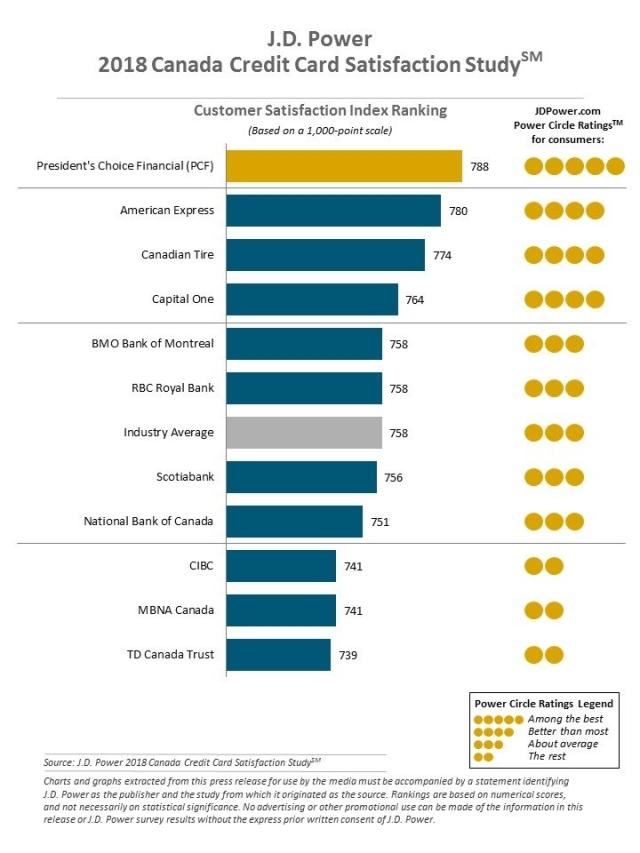Understanding, Redeeming Rewards Key to Satisfaction for Credit Card Holders, J.D. Power Finds
President’s Choice Financial Ranks Highest in Inaugural Canada Credit Card Satisfaction Study
TORONTO: 10 Sept. 2018 — Credit card holders in Canada place a high value on their rewards programs, so much so that 48% who switched their primary credit card during the past year did so for a better rewards program, according to the J.D. Power 2018 Canada Credit Card Satisfaction Study,SM released today. This is a significant finding from the inaugural study, considering that 87% of credit card holders are enrolled in a rewards program.
“There’s more to a satisfying rewards program than just the amount of points, miles or cash card holders can earn,” said Jim Miller, Vice President, Banking and Credit Card Practice at J.D. Power. “Understanding how to redeem rewards—and having redeemed rewards recently—has a significant effect on satisfaction and loyalty levels. As such, card issuers need to educate card holders on how to redeem their rewards and design programs in a manner that encourages frequent redemptions.”
According to the study, 64% of card holders say they completely understand how to redeem rewards. Overall satisfaction is 87 points higher among this group than among card holders who say they do not fully understand how the system works (796 vs. 709, respectively, on a 1,000-point scale). Furthermore, rewards redemption and frequency also contribute to higher satisfaction and loyalty levels. Satisfaction is higher among card holders who realized tangible benefits by redeeming rewards in the past month (792), compared with satisfaction among those who redeemed 1-3 months ago (780); those who redeemed more than a year ago (753); or those who have never redeemed (740). Cash back and airline tickets are the top two rewards card holders choose.
Within this context, it was recently announced that Air Canada, TD Bank, CIBC and Visa Canada jointly plan to buy Aeroplan, a coalition loyalty program. (Approximately 10% of card holders in Canada use an Aeroplan card as their primary credit card.) Prior to the announcement, the uncertainty surrounding Aeroplan was seen to have affected customer satisfaction.
“Air Canada buying Aeroplan is good news for Aeroplan card holders,” Miller added. “The Aeroplan program will move to a new Air Canada rewards program in 2020. It will be critical for the airline and credit card partners to build a new rewards program that is transparent and easy to understand.”
Following are some key findings of the 2018 study:
- Two is better than one: On average, consumers in Canada used two credit cards for the purchase of goods and services in the past three months, with 81% of their total spend charged on their primary card. The average length of time card holders stay with the same credit card issuer is 10 years, with a median monthly spend on the primary credit card of $600.
- Card holders in Canada embrace mobile, led by Gen Z[1]: More than half (51%) of credit card holders in Canada have used mobile apps during the past three months to manage their account, redeem rewards and take advantage of other benefits. This mobile adoption level is significantly higher than in the United States (39%). Among card holders in Canada, those in the Gen Z generational group have the highest level of mobile app adoption (79%). Perceptions of security may be hindering mobile adoption, as only 41% of card holders perceive their personal information is very secure when using a credit card app, and 36% perceive the mobile app is less secure than the website.
- Understanding the mobile app drives satisfaction: Mobile app adoption results in a slight lift in overall satisfaction (761 vs. 755, respectively), but the real benefit occurs when card holders say they completely understand the mobile offering. Overall satisfaction is 77 points higher among card holders who completely understand the mobile app than among those who do not completely understand the app (810 vs. 733, respectively).
“Usage and understanding of mobile apps have a strong correlation to customer satisfaction,” Miller said. “This, coupled with a higher adoption rate of mobile platforms by younger card holders, signals the future for credit card issuers. To gain a competitive advantage, issuers should focus on improving their mobile offerings and on educating their card holders about the benefits and security they provide.”
Study Rankings
President’s Choice Financial ranks highest in overall customer satisfaction, with a score of 788, which is 30 points higher than the industry average (758). American Express (780) ranks second and Canadian Tire (774) ranks third.
The Canada Credit Card Satisfaction Study measures satisfaction of card holders’ primary credit card issuer. The study measures performance in six factors (in alphabetical order): benefits; communication; credit card terms; customer interaction; key moments; and rewards. The study was fielded in May 2018 and includes responses from more than 6,000 card holders who used a major credit card in the past three months.
For more information about the Canada Credit Card Satisfaction Study, visit http://canada.jdpower.com/business/resource/canada-credit-card-satisfaction-study.
J.D. Power is a global leader in consumer insights, advisory services and data and analytics. These capabilities enable J.D. Power to help its clients drive customer satisfaction, growth and profitability. Established in 1968, J.D. Power is headquartered in Costa Mesa, Calif., and has offices serving North/South America, Asia Pacific and Europe. J.D. Power is a portfolio company of XIO Group, a global alternative investments and private equity firm headquartered in London, and is led by its four founders: Athene Li, Joseph Pacini, Murphy Qiao and Carsten Geyer.
Media Relations Contacts
Gal Wilder, Cohn & Wolfe, Toronto, Canada; 647-259-3261, gal.wilder@cohnwolfe.ca
Sandy Caetano, Cohn & Wolfe; Toronto, Canada; 647-259-3288, sandy.caetano@cohnwolfe.ca
Geno Effler, J.D. Power; Costa Mesa, Calif.; 714-621-6224; media.relations@jdpa.com
About J.D. Power and Advertising/Promotional Rules www.jdpower.com/about-us/press-release-info
[1] J.D. Power defines generational groups as Pre-Boomers (born before 1946); Boomers (1946 to 1964); Gen X (1965-1976); Gen Y (1977 to 1994); and Gen Z (1995-2004).
